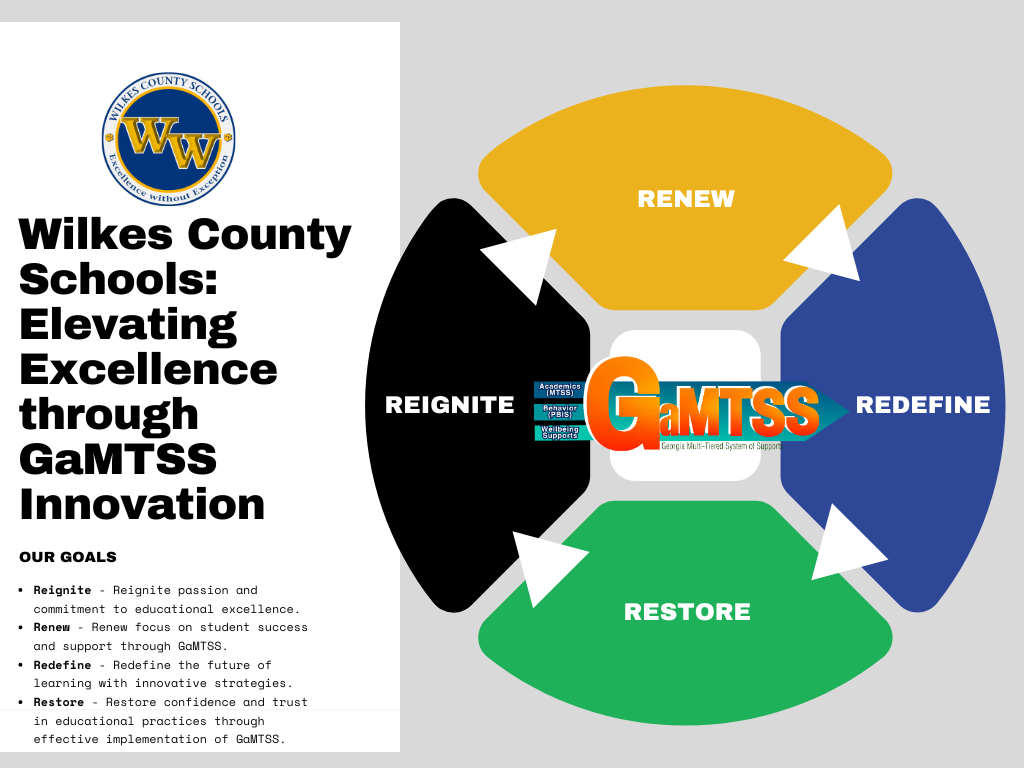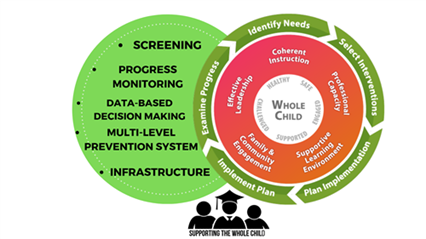Deleki Lee, Director of Curriculum and Instruction (MTSS Coordinator)
Katherine Burdette, Instructional Specialist (PBIS Coordinator)
Hannah Carmichael, School Psychologist
Wilkes County School System (WCSSS) strives for excellence in educating students to ensure students’ success tomorrow. It is a high priority that our students have equitable opportunities to succeed in school and the needs of the whole child are met. This is achieved through the implementation of a Multi-Tiered System of Supports (MTSS) as defined in HB740.

Deleki Lee, Director of Curriculum and Instruction (MTSS Coordinator)
Katherine Burdette, Instructional Specialist (PBIS Coordinator)
Hannah Carmichael, School Psychologist
GaMTSS is a preventive framework to improve outcomes for all learners. GaMTSS is designed to address academic, behavior, and well-being with evidence-based practices and interventions within a tiered system of supports since they are all interconnected. GaMTSS for WCSS students is the hub that connects the many available support services. When effectively implemented, a multitiered system of support equips educators with data to identify students requiring early intervention and those who may have a learning disability.
MTSS Defined…
“a systemic, continuous improvement framework in which data based problem-solving and decision making is practiced across all levels of the educational system for supporting students at multiple levels of intervention.” GaMTSS is a data-driven, multi-level prevention system designed to meet the needs of the whole child by implementing a continuum of tiered supports.

Grade level classroom instruction
Standards based curriculum
Universal screening to identify academic strengths and needs
Ongoing monitoring of student growth in response to instruction
Differentiated instruction to meet the needs of diverse learners
A wide array of strategies to help students master content
For students that need more than Tier 1 support to keep up with peers or close gaps in their learning
Provided in additon to Tier 1
Moderate-intensity support given 1-3 times per week
Includes ongoing systematic progress monitoring on the targeted skills to inform instructional decision-making
Includes small group instruction, typically 1-6 students
For students that need more than Tier1 and Tier2 supports to keep up with peers or close gaps in their learning
Provided in addition to Tier 1
Intensive support given 3-5 times per week
Includes evidence and research-based interventions that target specific skills for growth
Includes ongoing systematic progress monitoring on the targeted skills to inform instructional decision-making
Utilizes individual and small group instruction, typically 1-3 students
For General Education students, Tier 3 intensity supports are reviewed during during Student Support Team (SST) meetings. Parents are invited to Student Support Team meetings
Positive Behavioral Interventions and Supports (PBIS) is an evidence-based, data-driven framework proven to reduce disciplinary incidents, increase a school’s sense of safety and support improved academic outcomes. More than 19,000 U.S. schools are implementing PBIS and saving countless instructional hours otherwise lost to discipline. The premise of PBIS is that continual teaching, combined with acknowledgement or feedback of positive student behavior will reduce unnecessary discipline and promote a climate of greater productivity, safety and learning. PBIS schools apply a multi-tiered approach to prevention, using disciplinary data and principles of behavior analysis to develop school-wide, targeted and individualized interventions and supports to improve school climate for all students. (OSEP Technical Assistance Center on Positive Behavior Interventions & Supports, 2009)